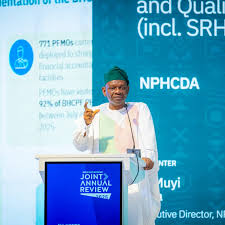By Iyemah David
The National Primary Health Care Development Agency (NPHCDA) says it is implementing far-reaching reforms to improve access, functionality, and accountability across Nigeria’s primary health care (PHC) system.
These reforms include the rollout of the Basic Health Care Provision Fund (BHCPF) 2.0, large-scale facility revitalisation, and digital workforce development.
Executive Director of NPHCDA, Dr Muyi Aina, stated this while presenting “Improving and Expanding PHC Functionality, Service Delivery and Quality of Care” at the 2025 Joint Annual Review of the Health Sector in Abuja.
He said the BHCPF 2.0 had expanded from 8,309 to 13,521 PHC facilities nationwide, allowing for quarterly disbursements of between N600,000 and N800,000 per facility based on patient volume.
Dr Aina said that the expansion was guided by equity and distance optimisation to ensure facilities were established in high-need and underserved areas.
“All 774 Performance and Financial Management Officers have been deployed across the country to strengthen accountability,” he said.
He added that the agency had introduced a digital performance and financial management app that tracks facility-level income, expenditure on commodities and human resources.
According to him, utilisation of key services such as immunisation, skilled delivery and antenatal care had risen three- to four-fold, with more than 47 million service contacts projected per quarter in 2025.
He said that the NPHCDA had revitalised 2,164 PHC facilities with improved infrastructure, equipment with solar-powered water and sanitation facilities, raising the number of fully functional “Level 2” PHCs from 10 per cent to 26 per cent.
He added that the agency had distributed essential medicines, maternal, newborn and reproductive health commodities to all 774 local government areas, including 110,000 “Mama Kits” to support safe deliveries.
On workforce strengthening, Dr Aina said that the agency had recruited 1,155 skilled health workers across five states, alongside 13,434 community health workers.
He said that more than 70,000 frontline workers had transitioned from in-person to e-learning training through 20 digitised modules, with content available in English, Hausa, Yoruba, Igbo, and Pidgin English to enhance comprehension and inclusivity.
“The e-learning platform allows health workers to take courses at their own paces and earn credits for continuing professional development. This makes training more sustainable and less disruptive to service delivery,” he said.
On immunisation, he said that the intensified vaccination (IV) strategy had reached 160,300 zero-dose children, while 3.4 million received polio vaccines and the Measles-Rubella campaign achieved 92 per cent coverage across 21 states.
He commended the collaboration with state governments, local councils and traditional leaders in sustaining progress under the PHC “one roof” policy.
“The next phase is to double down on what is working, scale up interventions, strengthen accountability and accelerate results,” he said.
He reaffirmed the agency’s commitment to advancing equitable, efficient and people-centred primary health care services across Nigeria.




